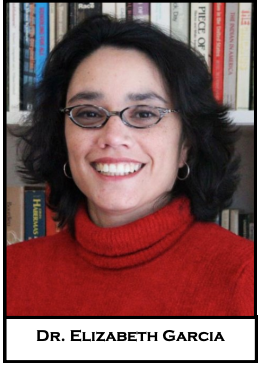 The Center is excited to welcome our newest colleague, Dr. Elizabeth Garcia.
The Center is excited to welcome our newest colleague, Dr. Elizabeth Garcia.
Dr. Garcia, who holds degrees in Economics, American Studies, and Ethnic Studies, was drawn to her field of study after taking an American Studies course at Brown University. “As an undergraduate I went to Brown University, which is a very elite, predominantly white, very wealthy institution, and I was none of those things. It was in my American Studies courses where we talked about people from different races and ethnicities, and it was really the first time that I saw my own experiences represented.” Dr. Garcia says that this experience “sparked the interest in continuing to not just learn from myself but also to teach to others.”
Dr. Garcia’s interdisciplinary research pulls from the fields of history, cultural studies, and literature to examine Latina women’s conceptions of citizenship and belonging. “The main thing that I study is literature, and literary works that are typically novels and autobiographies,” she says. “I take an intersectional approach so I look at literature, but I look at how it represents social issues, such as issues of race, class, sexuality, gender. How do the authors complicate things, what kind of questions do they raise in their presentations of all these different things?”
These questions were central to Dr. Garcia’s approach to her first book, Healing Memories: Puerto Rican Women’s Literature in the U.S., which was published earlier this year as part of a Latino studies series by the University of Pittsburgh Press. Describing the writing and researching process, Dr. Garcia says “The way I approached Puerto Rican women’s literature was looking specifically at how these women authors were writing and documenting the history of Puerto Ricans in the United States through their literary works. I was combining both gender and ethnic identity and how they complicated those two identities through their literary works.” On working with this press, Dr. Garcia says “different publishers are trying to do their part to have a counter-narrative to the national one. I think that context in the academic publishing world allows for my kind of work to have a space.”
Dr. Garcia is currently working on her next book, which aims to expand on her previous work by exploring the narratives of different Latina groups. The book will look at “specifically how, given the anti-immigrant climate that we’re in now, women, Latina women in particular, and their literary works re -imagine forms of belonging and citizenship.”
Drawing from her scholarship, Dr. Garcia is launching a course titled “#SayHerName” as part of the new Quest curriculum for first-year students. Dr. Garcia says “[the course] is about feminist women of color and will utilize a historical perspective. I have taught versions of that class before at other institutions with first year students and it worked really well. I’m hoping that it will have the same response here.” The course title refers to the recent social media movement that brings awareness to the ways Black and African American women and other women of color have been both targeted and silenced by racialized and sexualized violence. Dr. Garcia says this course will use various texts, specifically personal essays and historical narratives, applying a range of feminist theories and critically exploring various historical methodologies. Core questions explored through the course will be: How do race and class influence definitions of feminism and feminist activism? How did these women use their activism to define their place in the world? How did they navigate conflict within their activist spaces? What lessons can we learn from their experiences that can be applied in our contemporary times? Dr. Garcia says, “I know that the histories that they’re going to read in this class are not histories they’ve ever been exposed to before, such as the experiences of indigenous women in this country, African American women, and so on.” Her goal is to encourage her students “to think about those women in relationship to feminism, which is something that not a lot of people tend to do.” With this in mind, Dr. Garcia says “If I can get first year students that exposure at an early part of their educational experience, hopefully that inspires them to not only major in Women’s Studies, but also to continue to look for those kinds of experiences and courses, and to learn from the beginning to ask all kinds of questions: What am I not learning? What’s missing from my education? Hopefully we’ll learn how to do that in my class.”
In addition to #SayHerName, Dr. Garcia will be teaching a graduate course on Latina narratives and the first ever honors section of WST3015, Interdisciplinary Perspectives in Women’s Studies. Dr. Garcia says “It’s going really well. Teaching a section for the honors program is great because it allows for the honors program and the Center to have a bridge.”